SUBJECT INDEX: United Kingdom | Glanville Williams: Learning the Law 18th Edition
|
| | |
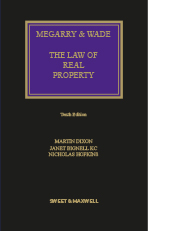 | Megarry & Wade The Law of Real Property 10th Edition
|
| | |
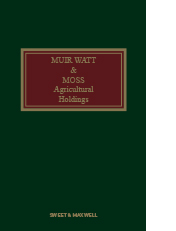 | Muir Watt & Moss: Agricultural Holdings 16th Edition
|
| | |
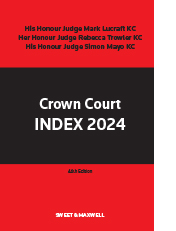 | Crown Court Index 2024 44th Edition
|
| | |
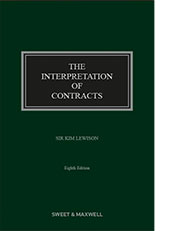 | The Interpretation of Contracts 8th Edition
|
| | |
 | Kerly's Law of Trade Marks and Trade Names 17th Edition
|
| | |
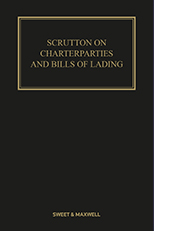 | Scrutton on Charterparties and Bills of Lading 25th Edition
|
| | |
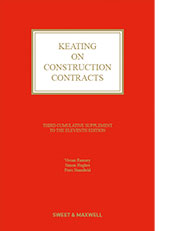 | Keating on Construction Contracts 11th Edition, 3rd Supplement
|
| | |
 | Listed Buildings and Other Heritage Assets 6th Edition
|
| | |
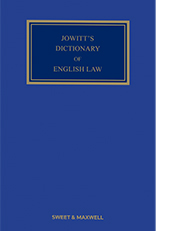 | Jowitt's Dictionary of English Law 6th Edition
|
| | |
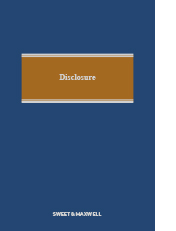 | Disclosure 6th Edition
|
| | |
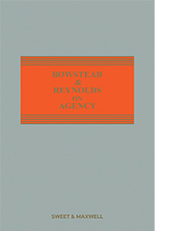 | Bowstead and Reynolds on Agency 23rd Edition
|
| | |
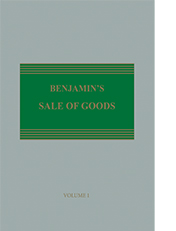 | Benjamin's Sale of Goods 12th Edition
|
| | |
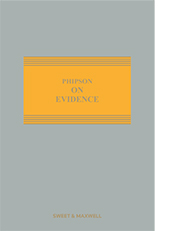 | Phipson on Evidence 20th Edition Mainwork + Supplement
Part of the Common Law Library series, Phipson on Evidence is the leading work on civil and criminal evidence. It examines in detail all aspects of the principles and procedures making up the law of evidence. Coverage includes the admission of evidence, the standard of proof, the attendance of witnesses, good and bad character, legal professional privilege, hearsay, expert evidence, confessions, judicial discretion and many other evidential issues. Key Features - Leading work and authority on civil and criminal evidence, frequently quoted in court
- Written by a prominent team of expert authors, with excellent balance between leading practitioners and academics
- Fully updates all changes brought in by the Civil Procedure Rules and the Criminal Procedure Rules
- Examines in detail all aspects of the complex principles and procedures which make up the law of evidence including admission of evidence, evidence taken or served prior to a trial, the rules of evidence during the course of a trial and the examination of witnesses
- Considers the burden and standard of proof
- Discusses all aspects of good and bad character
- Includes analysis of privilege and facts excluded by public policy
- Examines hearsay in civil and criminal proceedings
- Looks at the exclusion and inclusion of extrinsic evidence
- Examines the judicial discretion to admit or exclude evidence
- Considers a broad range of case law, including that of the Commonwealth
New to this supplement The First Supplement to the Twentieth Edition covers all the latest developments in the law of evidence since publication of the Twentieth Edition in December 2021. These include important decisions on admission of evidence, the standard of proof, the attendance of witnesses, good and bad character, legal professional privilege, hearsay, expert evidence, confessions, judicial discretion and many other evidential issues. The supplement also considers important decisions from the Supreme Court and Court of Appeal such as R. v Carlos Wright [2022] EWCA Crim 1722, and AIC Ltd v Federal Airports Authority of Nigeria [2022] UKSC 16 to name a few. Also available as an eBook on Thomson Reuters ProView Thomson Reuters ProView is custom built for legal professionals like you. |
| | |
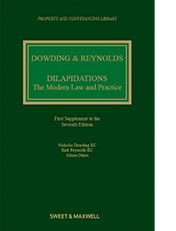 | Dilapidations: The Modern Law and Practice 7th Edition, 1st Supplement
|
| | |
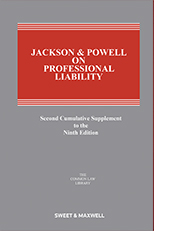 | Jackson & Powell on Professional Liability 9th Edition, 2nd Supplement
|
| | |
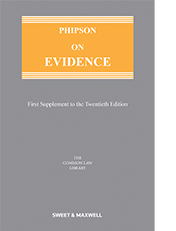 | Phipson on Evidence 20th Edition, 1st Supplement
|
| | |
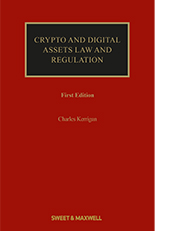 | Crypto and Digital Assets Law and Regulation
|
| | |
 | Equity & Trusts in Australia, 8th Edition
The eighth edition of Equity and Trusts in Australia remains the leading text for students of equity and trusts. It continues to provide a comprehensive, but at the same time, accessible coverage of the law of equity and trusts in Australia. Equity and Trusts in Australia places that law in the context of developments, both judicial and legislative, in other common law countries. At the same time, it adopts a critical analysis in areas of uncertainty, and makes very frequent reference to the views of commentators from Australia and elsewhere.
The detail and breadth of coverage of this book make it authoritative, as evidenced by its multiple citations in superior courts in Australia and elsewhere. This text is therefore an essential resource for the practitioner. Its accessible style, coupled with an accompanying casebook that adopts the same chapter order and structure, also makes the work ideal for students. Together they mark the work as unique in Australian equity and trusts
CLICK HERE, USE PROMO CODE: AUS0823 to buy the title at a special discounted price. Offer valid till valid from now until 31 August 2023.
|
| | |
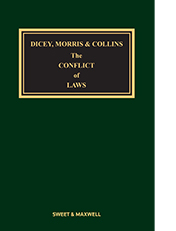 | Dicey, Morris & Collins on the Conflict of Laws 16th Edition Mainwork + Supplement
Dicey, Morris Collins on The Conflict of Laws is renowned worldwide as the foremost authority on private international law. It explains the rules, principles and practice that determine how the law of England Wales relates to other legal systems. Its commentary, Rules and illustrations, with detailed reference to international conventions, legislation and case law, ensures it remains an indispensable tool for practitioners engaged in cross-border matters.
Across two volumes and a Companion Volume, it contains high-quality and detailed analysis. Volume 1 deals with general principles, the effects of withdrawal by the United Kingdom from the European Union, foreign affairs and the conflict of laws, procedural issues relating to international litigation, jurisdiction, recognition and enforcement of foreign judgments and arbitration. Volume 2 deals with a number of specific areas of law. It addresses family law, property law, succession and trusts, corporations and insolvency and the law of obligations. A Companion Volume considers in greater detail the transitional issues arising from the United Kingdoms withdrawal from the European Union and the relevant EU legislation in a number of key areas.
The First Supplement to the 16th Edition brings the Main Work up-to-date. It deals with all developments since the publication of the Main Work.
Important developments considered in the First Supplement to the 16th Edition include:
- Detailed commentary on the revisions to the grounds for service out of the jurisdiction applicable from October 1, 2022.
- All the many new High Court and appellate cases on jurisdiction and enforcement of foreign judgments.
- Authorities on the enforcement of arbitration agreements.
- Analysis of new authorities on foreign affairs and the conflict of laws.
- Important new decisions on aspects of cross-border family law.
- New decisions on the interpretation of the rules on choice of law for contractual and non-contractual obligations and property.
- Consideration of case law on transitional issues arising following the withdrawal by the United Kingdom from the European Union.
Also available as an eBook on Thomson Reuters ProView
Thomson Reuters ProView is custom built for legal professionals like you. |
| | |
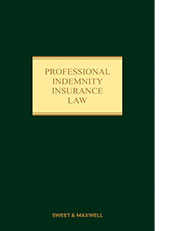 | Professional Indemnity Insurance Law 3rd Edition
|
| | |
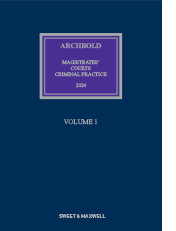 | Archbold Magistrates' Court Criminal Practice 2024
|
| | |
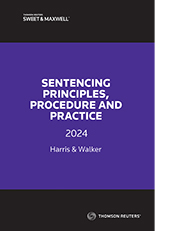 | Sentencing Principles, Procedure and Practice 2024
|
| | |
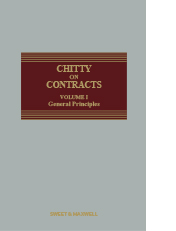 | Chitty on Contracts 35th Edition, 2 volumes
|
| | |
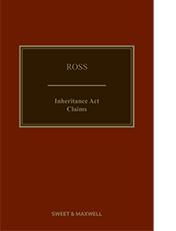 | Inheritance Act Claims 5th Edition
|
| | |
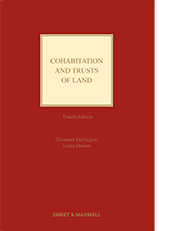 | Cohabitation and Trusts of Land 4th Edition
|
| | |
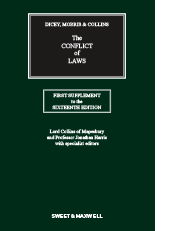 | Dicey, Morris & Collins on the Conflict of Laws 16th Edition 1st Supplement
|
| | |
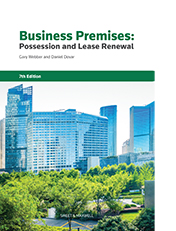 | Business Premises: Possession and Lease Renewal 7th Edition
|
| | |
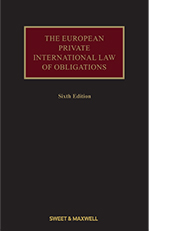 | European Private International Law of Obligations 6th Edition
|
| | |
 | Equity & Trusts 7th Edition
|
| | |
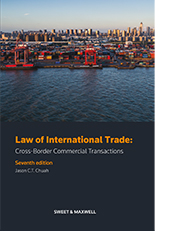 | Law of International Trade 7th Edition
|
| | |
 | Equity & Trusts 7th Edition
|
| | |
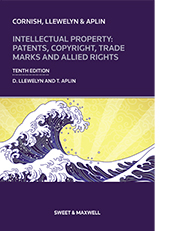 | Intellectual Property: Patents, Copyrights, Trademarks & Allied Rights 10th Edition
|
| | |
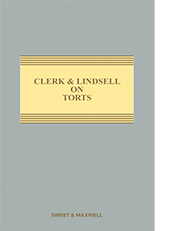 | Clerk & Lindsell on Torts 24th Edition
Clerk Lindsell on Torts, one of our flagship titles and part of the Common Law Library series, is an essential reference tool which is widely referred to by practitioners and cited by the judiciary throughout the UK and the Commonwealth, and also forms the point of reference worldwide for those wishing to research the English law of torts. It offers the most comprehensive coverage of the subject, providing the end user with indispensable access to current, frequent and unrivalled authoritative information on all aspects of tort law.
Key Features:
- Provides unrivalled breadth and depth of coverage on all areas of tort law
- Sets out both general principles and the detailed rules of liability affecting specific torts
- Explains in detail general matters, such as defences, joint liability and vicarious liability, and capacity and parties
- Covers all the important heads of tortious liability: negligence, breach of statutory duty, professional liability, product liability and occupiers liability, malicious prosecution and abuse of process, wrongful interference with goods, deceit, to trespass to land and to the person. Other chapters range from liability for animals to nuisance and Rylands v Fletcher, and from malicious falsehood to the economic torts, defamation, breach of confidence and misuse of private information
- Deals extensively with the vital topic of damages and other remedies, including injunctions
- Covers limitation in detail
- Takes full account of the effects of Brexit
New material in the Twenty-Fourth Edition:
- Henderson v Dorset Healthcare University NHS Foundation Trust and Stoffel Co v Grondona on the extent of the illegality defence in tort.
- FCA v Arch Insurance (UK) Ltd on the subject of adequate causation.
- Okpabi v Royal Dutch Shell Plc on the duty of care owed by a holding company for the acts of its subsidiaries abroad.
- Toombes v Mitchell on the boundaries of wrongful birth and wrongful life.
- Bell v Tavistock Portman NHS Foundation Trust on older childrens ability to consent to medical procedures.
- Allsop v Banner Jones Ltd on solicitors negligence claims and abuse of process.
- Rihan v Ernst Young Global Ltd on employers duties to look after employees interests.
- Leeds City Council v Barclays Bank Plc on the requirement for a representation in the tort of deceit.
- Duchess of Sussex v Associated Newspapers Ltd on misuse of private information and breach of copyright.
- Kawasaki Kisen Kaisha Ltd v James Kemball Ltd on how far the deliberate defunding of a company can amount to an economic tort.
- Swift v Carpenter on damages for serious injury and funding the purchase of a suitable property for a seriously disabled claimant.
- Canada Goose UK Retail Ltd v Persons Unknown and Boyd v Ineos Upstream Ltd on property, injunctions, protests and human rights.
Also available as an eBook on Thomson Reuters ProView
Thomson Reuters ProView is custom built for legal professionals like you. |
| | |
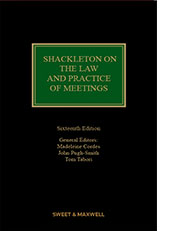 | Shackleton on The Law and Practice of Meetings 16th Edition
|
| | |
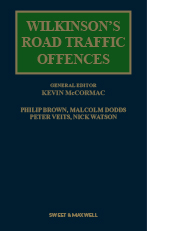 | Wilkinson's Road Traffic Offences 31st Edition
|
| | |
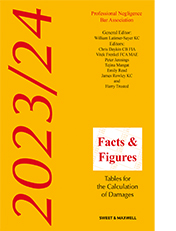 | Facts & Figures 2023/24 28th edition
|
| | |
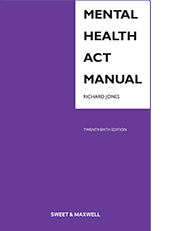 | Mental Health Act Manual 26th Edition
|
| | |
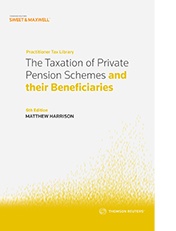 | Taxation of Private Pension Schemes and their Beneficiaries, The 6th Edition
|
| | |
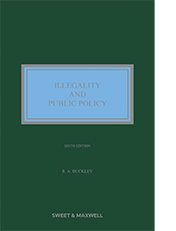 | Illegality and Public Policy 6h Edition
|
| | |
 | Shackleton on The Law and Practice of Meetings 16th Edition
|
| | |
 | Goode on Legal Problems of Credit and Security 7th Edition
|
| | |
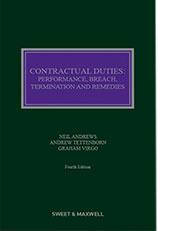 | Contractual Duties 4th Edition
|
| | |
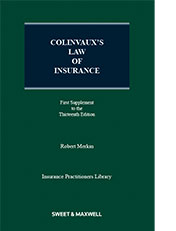 | Colinvaux's Law of Insurance 13th Edition, 1st Supplement
|
| | |
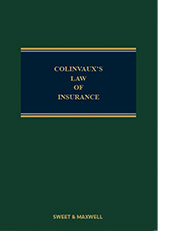 | Colinvaux's Law of Insurance 13th Edition Mainwork + Supplement
Winner of the 2019 British Insurance Law Association (BILA) annual book prize
Construction Professional Indemnity Insurance, second edition, is the definitive practitioner reference for all those involved in construction projects, from contractors to employers, architects to insurance brokers. Complementing Construction All Risks Insurance, these are the two titles all construction and insurance professionals need.
The second edition covers updates including:
- The Fire Safety Act 2021 and the Building Safety Act 2022, which were introduced following Grenfell, and
- Payment of damages for late payment of insurance claims and the case of Quadra Commodities.
Construction Professional Indemnity Insurance also provides in depth analysis of insurance and construction law, including the recent decisions of:
- The Court of Appeal in Euro Pools v RSA, which clarified the law relating to notification of claims,
- The Supreme Court in FCA v Arch, and
- The TCC in The Rugby Football Union v Clark Smith Partnership Limited and FM Conway Limited as to who is insured.
Also available as an eBook on Thomson Reuters ProView
Thomson Reuters ProView is custom built for legal professionals like you. |
| | |
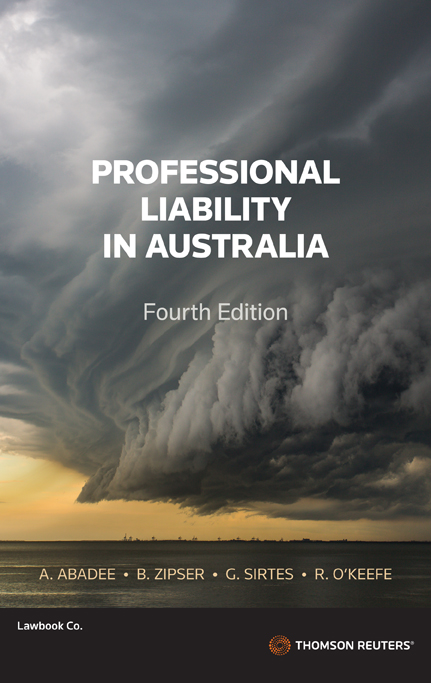 | Professional Liability in Australia, 2nd Edition
Professional Liability in Australia Fourth Edition provides a comprehensive and definitive analysis of the law of professional liability, bringing together the law for a range of different professions.
Following a discussion of general principles, each chapter explores the issues as they relate to doctors, solicitors, barristers, accountants and auditors, building professionals, valuers and financial services professionals.
The issues essential to each profession are discussed, such as:
- duties owed to clients and third parties (in statute and in general law);
- standard of care and skill required;
- principles of liability;
- liability for breach of duty;
- defences available; and
- damages and other remedies.
New developments incorporated in the Fourth Edition include:
- High Court decisions relating to:
- the advocate’s immunity from suit;
- the standard of care required of health professionals;
- the scope of duty, causation, loss of chance and provisions of Tasmania’s Civil Liability Act; and
- provisions of the Australian Consumer Law relevant to professional liability.
- More than 100 lower court decisions concerning claims against legal, medical, accounting, financial, building, and valuation professionals, including appellate court decisions forming Australia-wide precedents, and matters relating to civil liability acts in each jurisdiction.
- Consideration of the Design and Building Practitioners Act 2020 (NSW) and the statutory obligations it places on builders, architects, engineers and building professionals.
- Commonwealth exposure draft bills in response to the Royal Commission into Misconduct in the Banking, Superannuation and Financial Services Industry.
- Revised chapter on medical professionals broadening the scope from doctors to health services professionals.
Professional Liability in Australia Fourth Edition is an essential resource when prosecuting or defending professional liability claims.
CLICK HERE, USE PROMO CODE: AUS0823 to buy the title at a special discounted price. Offer valid till valid from now until 31 August 2023.
|
| | |
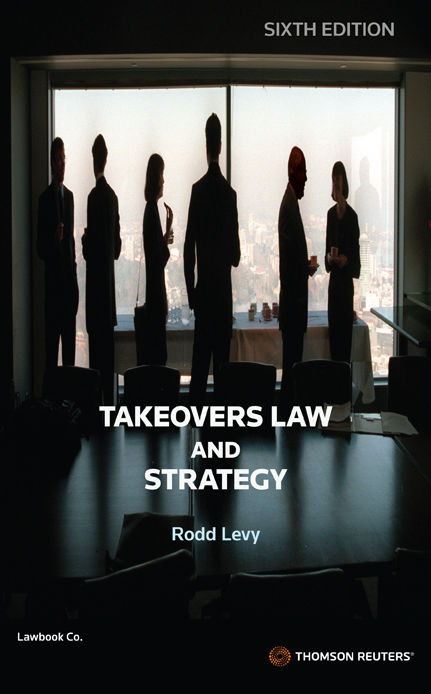 | Takeover Law & Strategy, 6th Edition
For over 25 years, Takeovers Law & Strategy has been the leading source of practical and comprehensive guidance to the laws, procedures and tactics involved in takeovers bids in Australia.
Rodd Levy is one of Australia’s most experienced takeover practitioners, and his work considers a myriad of technical and practical issues confronted by bidders, target companies, directors and shareholders in the course of planning, executing and responding to a takeover bid.
New developments in the 6th edition include topics and issues considered in more than 130 decisions handed down by the Takeovers Panel since 2017. The work is extensively revised to deal with developments affecting topics such as:
- The Corporate Collective Investment Vehicle regime;
- Foreign investment approval requirements;
- Rules for approving anti-competitive takeovers;
- Factors relevant to deciding whether to use a scheme of arrangement or a takeover bid;
- The financial assistance prohibition;
- Conflicts of interests;
- Disclosure of equity derivatives;
- Shareholder intention statements;
- Takeover bid implementation agreements;
- Takeover bid conditions;
- Truth in takeovers;
- Exclusivity granted during pre-bid discussions;
- Shareholder applications to the Takeovers Panel; and
- Delisting post-takeover despite minority shareholdings.
Takeovers Law & Strategy 6th Edition is an essential resource for anyone involved or interested in takeover activity, including lawyers, company directors and executives, investment bankers and students.
CLICK HERE, USE PROMO CODE: AUS0823 to buy the title at a special discounted price. Offer valid till valid from now until 31 August 2023.
|
| | |
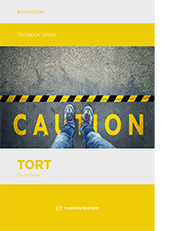 | Tort 8th Edition
|
| | |
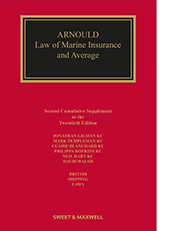 | Arnould: Law of Marine Insurance and Average 20th Edition, 2nd Supplement
|
| | |
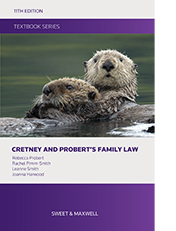 | Cretney and Probert's Family Law 11th Edition
|
| | |

















































